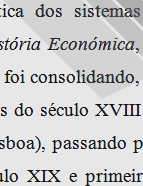

................................
When attention was initially aroused to economic issues, the role of the Royal Academy of Sciences of Lisbon, founded in 1779, was highlighted through the publication of the Memórias da Academia das Ciências de Lisboa [Memoirs of the Academy of Sciences of Lisbon](5 volumes, 1789-1815). An initial significance of these Memórias lies in their "representation of a process of awareness and reflection on national economic problems which, within the institutional framework of the Academy of Sciences of Lisbon, was gradually becoming consolidated" (José Luís Cardoso, "Introdução," Memórias Económicas da Academia...["Introduction," Economic Memoirs of the Academy] vol. I, 1990, p. XIX). This involved a rigorous survey of the country's economic potential and problems, with a view to its development. However, the initiative also contributed to obtaining more in-depth knowledge of aspects that more recently have become part of the scientific and pedagogical economic history programmes. A considerable part of the work focused precisely on "economic problems and mechanisms" (Id., Idem, p. XXVII; Idem, O pensamento económico em Portugal...[Economic thought in Portugal], 1989, pp. 35-123). To some extent, the historiographical modality that is currently known as the "history of the present" was already being cultivated. In the early decades of the 19th century, José Acúrsio das Neves (1766-1834) was a particularly notable figure. He was a contradictory character, absolutist in politics but liberal in political economy (A. Almodovar and A. Castro, Obras Completas de...[Complete Works of], vol. I, 1983, pp. 19-20). However, he has also been considered "one of the most lucid minds of the first half of the 19th century and, undoubtedly, one of the greatest figures in economic thought in Portugal" (J. Tengarrinha, "Neves, José Acúrsio das (1766-1834)," Dicionário...[Dictionary], pp. 143-144). A graduate in Law from the University of Coimbra, he held various positions including that of magistrate and ombudsman in Angra do Heroísmo (Terceira Island, Azores), assemblyman of the Real Junta de Comércio, Agricultura, Fábricas e Navegações [Royal Board of Commerce, Agriculture, Factories, and Navigation], deputy director of the Real Fábrica das Sedas [Royal Silk Factory] and the Obras das Águas Livres [Águas Livres Works], as well as judge of the Porto Court of Appeal.
